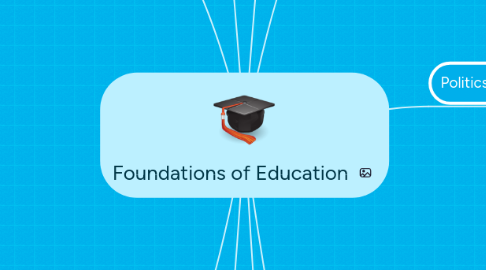
1. History of US Education
1.1. Our purpose now?
1.1.1. Transmit culture
1.1.2. Prepare for global economy
1.1.3. Prepare for the workforce
1.1.4. Become a productive citizen
1.1.5. Become a social citizen
1.1.6. Pursuit of happiness
1.1.7. Pursuit of freedom
1.1.8. Pursuit of knowledge
1.1.9. Pursuit of life
1.2. Old Deluder Laws
1.2.1. Boys only
1.2.2. Public Schools
1.3. Common School
1.4. Child-centered reform
1.5. Utilitarianism
1.6. Civic Motive
1.7. Embryonic Community
1.8. Social-engineering reform
1.9. Meritocracy
1.9.1. Thomas Jefferson
2. Educational Inequality
2.1. Sociological explanations of inequality
2.1.1. Functionalist Theorists
2.1.1.1. supports the ideal that each student success is determined by their own hard work and desire to succeed
2.1.2. Conflict Theorists
2.1.2.1. Supports the idea that student success is affected by their environment
2.1.3. Interactionists Theorists
2.1.3.1. Supports that student success is determined by a combination of factors such as family, social class schools and environments
2.2. Student centered
2.2.1. Factors such as family, peer group, community, culture and the student
2.2.2. Genetic Differences Explanations
2.2.3. Cultural Deprivation Explanations
2.2.4. Cultural Differences Explanations
2.3. School Centered
2.3.1. Factors include teachers, teaching methods, curriculum, school climate and teacher expectations
2.3.2. School Financing
2.3.3. Effective Schools
2.3.4. Between School Differences
2.3.5. Curriculum and Pedagogic
2.3.6. Curriculum and Ability Grouping
3. Philosophy of Education
3.1. Teacher-centered
3.1.1. Essentialism
3.1.1.1. emphasis on academics
3.1.1.2. academically rigorous
3.1.1.3. promotion based on mastery of material
3.1.2. Perenialism
3.1.2.1. focus on classic ideals
3.1.2.2. develop reason and moral qualities
3.1.2.3. teachers set curriculum
3.1.2.4. little flexibility in curriculum
3.1.2.5. emphasis on learning for learning sake
3.1.2.6. focus on concepts rather than facts
3.2. student-centered
3.2.1. progressivism
3.2.1.1. experiential learning
3.2.1.2. grouping by interest and abilities
3.2.1.3. teaching through field trips and games
3.2.1.4. students learn by doing as well as from textbooks
3.2.1.5. education based on needs and interests of students
3.2.1.6. pragmatist
3.2.1.6.1. john dewey
3.2.2. social reconstructionism
3.2.2.1. physical world as the basis of reality
3.2.2.2. focus on social, political, & economic needs
3.2.2.3. learning by reconstructing society
3.2.2.4. learning from meaning social experiences
4. Equality of Opportunity
4.1. Calculating Educational
4.2. Life Outcomes
4.3. Human differences do not cause social stratification.
4.4. Social stratification
4.4.1. Caste
4.4.2. Estate systems
4.4.3. Class systems
4.5. Educational achievement
4.5.1. directly related to family achievement & social class
4.5.2. related to financial success
4.5.3. Parental income is directly related to educational achievement and test performance
4.6. Race
4.6.1. impacts on how much educational attainment a person achieves
4.7. Gender
4.7.1. Disparities still exist in education and job salaries.
4.8. SAT & ACT
4.8.1. Test have become the determining factor for educational success
4.8.2. Test have favored the white Americans and upper and middle class students.
4.9. Coleman study 1966
4.9.1. as a result lower class students should attend schools with the middle and upper class to improve their educational success
5. Education Reform
5.1. Characteristics of highly effective teachers
5.1.1. A calling for the profession
5.1.2. Professional Knowledge
5.1.3. Personal Qualities
5.1.4. With-it-ness
5.1.5. Instructional Effectiveness
5.1.6. Good Communicator
5.1.7. Street smart
5.1.8. Lifelong learner
5.2. Federal involvement
5.3. America 2000
5.4. Goals 2000
5.5. No Child Left Behind
5.6. Race To The Top
5.7. School Based Reforms
5.8. School choices
5.9. Charter Schools
5.10. Tuition Vouchers
5.11. School Finance Reforms
5.11.1. Where you are born or live determines your advantages for a good education
5.12. Full Services Schools
6. Sociological Perpectives
6.1. Are Schools a reflection of our society/community
6.1.1. Materials
6.1.2. Personel
6.1.3. Services
6.1.4. Duration
6.2. How does the impact of social expectatios drive decision asking socially?
6.3. Are schools perpetuating the social class/coity it serves?
6.4. schools transmit
6.4.1. value on society
6.5. conflict theory
6.5.1. things get better with conflict
6.6. Interactional theory
6.6.1. depends on what they want to do
6.7. sociology
6.7.1. understanding what we are, why we are here, decide what they want to be, making life better for yourself
7. Politics of Education
7.1. Conservative
7.2. Liberal
7.3. Radical
7.4. Neo-liberal
7.5. Traditional vision of education
7.6. Progressivism vision of education
8. Pedagogy & Curriculum
8.1. What is taught and how do we teach it?
8.1.1. Social Influence
8.1.2. Political influences
8.1.3. Cultural influences
8.1.4. Special interests
8.2. Historically
8.2.1. Conservatist say we should return to a humanist foundation
8.2.2. Teach math, science, reading, history, and influences of western civilization
8.3. Political influences of the curriculum.
8.3.1. Who shapes the curriculum and determines what is taught.
8.3.2. Should business determine the curriculum?
8.3.3. Should religion determine the curriculum?
8.4. Other influences on the curriculum
8.4.1. Evolutionists
8.4.2. Creationists
8.4.3. Science and math
8.4.4. Nation at risk
8.4.5. NCLB
8.4.6. RTT
8.5. Effects of the curriculum
8.5.1. Do students actually learn what is taught?
8.5.2. Closing the gap and how
8.5.3. Effective school characteristics
8.5.4. Do all students have the same educational experiences even though they attend the same classes.
8.6. What is taught is our school?
8.6.1. Formal curriculum
8.6.1.1. What is cognitively taught (subjects)
8.6.2. Informal or hidden curriculum
8.6.2.1. taught but not obvious to sight
8.6.3. Null curriculum
8.6.3.1. What is not taught but is learning (values of the community)
9. schools as organizations
9.1. school processes
9.2. culture of schools
9.2.1. Waller, 1965
9.3. Role switching
9.4. contradictions of control
9.4.1. McNeil, 1988
9.5. social realities of teaching
9.5.1. Lieberman & Miller, 1984
9.6. openness
9.6.1. open to all and vey inclusive
9.6.2. very democratic process of education
9.6.3. very few academic impediments exist to graduate high school
9.7. bureaucracy
9.7.1. Weber, 1976
